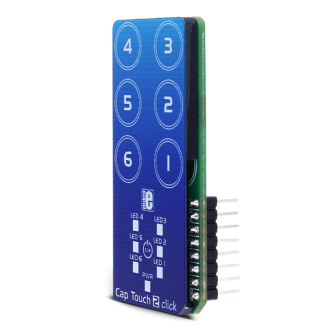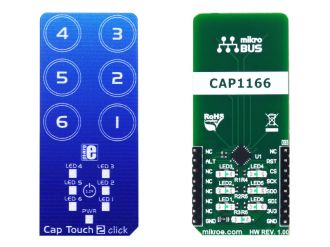
We strongly encourage users to use Package manager for sharing their code on Libstock website, because it boosts your efficiency and leaves the end user with no room for error. [more info]

Rating:
Author: MIKROE
Last Updated: 2018-07-06
Package Version: 1.0.0.0
mikroSDK Library: 1.0.0.0
Category: Proximity
Downloaded: 5677 times
Not followed.
License: MIT license
Cap Touch 2 click is a capacitive touch sensing click board, with the advanced touch/proximity sensor IC, based on the proprietary RightSense technology from Microchip. Cap Touch 2 click has six touch sensitive channels and six independent LED drivers with several operating modes, including touch sensor linking.
Do you want to subscribe in order to receive notifications regarding "Cap Touch 2 click" changes.
Do you want to unsubscribe in order to stop receiving notifications regarding "Cap Touch 2 click" changes.
Do you want to report abuse regarding "Cap Touch 2 click".


Library Description
The library initializes and defines SPI bus driver and driver functions which offer a choice to write data in registers and to read data from registers. The library also offers a choice to detect touch on enabled sensor inputs in two possible modes, Active and Standby mode. Sensor inputs can also be configured to detect when touch is released and can generate an interrupt as long as the touch is detected. For more details check the documentation.
Key functions:
void captouch2_writeReg( const uint8_t register_address, const uint8_t transfer_data ) - The function writes one byte to register.
void captouch2_readReg( const uint8_t register_address, uint8_t *dataOut, const uint8_t nBytes ) - The function reads data from the register.
void captouch2_detectTouch( uint8_t *inputSens ) - The function detects touch on sensor inputs and checks if touch is detected or if touch is released.
void captouch2_setActiveMode( const uint8_t analogGain, const uint8_t enInput ) - Function puts device in Active mode and enables desired inputs in Active mode.
Examples Description
The demo application is composed of three sections:
void applicationTask()
{
captouch2_detectTouch( &sensorResults[0] );
for (cnt = 0; cnt < 6; cnt++)
{
if (sensorResults[ cnt ] == 1)
{
if (cnt == 0)
mikrobus_logWrite( "Input 1 is touched", _LOG_LINE );
else if (cnt == 1)
mikrobus_logWrite( "Input 2 is touched", _LOG_LINE );
else if (cnt == 2)
mikrobus_logWrite( "Input 3 is touched", _LOG_LINE );
else if (cnt == 3)
mikrobus_logWrite( "Input 4 is touched", _LOG_LINE );
else if (cnt == 4)
mikrobus_logWrite( "Input 5 is touched", _LOG_LINE );
else
mikrobus_logWrite( "Input 6 is touched", _LOG_LINE );
}
else if (sensorResults[ cnt ] == 2)
{
if (cnt == 0)
mikrobus_logWrite( "Input 1 is released", _LOG_LINE );
else if (cnt == 1)
mikrobus_logWrite( "Input 2 is released", _LOG_LINE );
else if (cnt == 2)
mikrobus_logWrite( "Input 3 is released", _LOG_LINE );
else if (cnt == 3)
mikrobus_logWrite( "Input 4 is released", _LOG_LINE );
else if (cnt == 4)
mikrobus_logWrite( "Input 5 is released", _LOG_LINE );
else
mikrobus_logWrite( "Input 6 is released", _LOG_LINE );
mikrobus_logWrite( "", _LOG_LINE );
}
}
}
Other mikroE libraries used in the example:
Additional notes and information
Depending on the development board you are using, you may need USB UART click, USB UART 2 click or RS232 click to connect to your PC, for development systems with no UART to USB interface available on the board. The terminal available in all MikroElektronika compilers, or any other terminal application of your choice, can be used to read the message.